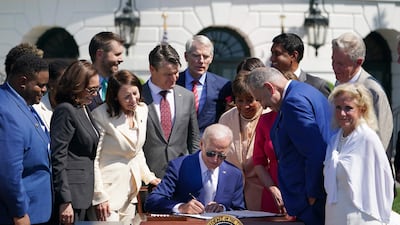President Joe Biden on Tuesday signed a multi-billion-dollar bipartisan bill aimed at boosting semiconductor production and research in an effort to make the US more competitive with China.
"The future of the chip industry is going to be made in America," Mr Biden said at a signing ceremony on the White House South Lawn.
"It means unleashing the next generation of American innovation. It means building more secure supply chains, and protecting American global leadership and values."
Mr Biden said he visited a Lockheed Martin facility where Javelin missiles were made and said the CHIPS and Science Act would make the US less reliant on other nations to provide the technology needed for those weapon systems.
“Unfortunately, we produce zero per cent of these advanced chips and China is trying to move way ahead of us to manufacture these sophisticated chips as well,” he said.
The White House sees the bill as crucial to countering China and ensure that the US maintains its competitiveness against Beijing. The legislation provides $52.7 billion for semiconductor research, development, manufacturing and workplace development, the White House said.
"It's a once-in-a-generation investment in America itself," Mr Biden said.
Before the ceremony, leading US chip manufacturer Micron announced a $40bn investment in memory chip manufacturing that would be used for computers and other electronics. Qualcomm and Global Foundries announced a new partnership that would include a $4.2bn investment at a facility in upstate New York.
Tuesday's signing ceremony was one of several scheduled since Mr Biden tested negative for Covid-19 on Saturday. Mr Biden appeared to be dealing with some residual symptoms, coughing heavily during his remarks.
The White House said Mr Biden tested negative for Covid-19 again on Tuesday morning.
CHATGPT%20ENTERPRISE%20FEATURES
%3Cp%3E%E2%80%A2%20Enterprise-grade%20security%20and%20privacy%3C%2Fp%3E%0A%3Cp%3E%E2%80%A2%20Unlimited%20higher-speed%20GPT-4%20access%20with%20no%20caps%3C%2Fp%3E%0A%3Cp%3E%E2%80%A2%20Longer%20context%20windows%20for%20processing%20longer%20inputs%3C%2Fp%3E%0A%3Cp%3E%E2%80%A2%20Advanced%20data%20analysis%20capabilities%3C%2Fp%3E%0A%3Cp%3E%E2%80%A2%20Customisation%20options%3C%2Fp%3E%0A%3Cp%3E%E2%80%A2%20Shareable%20chat%20templates%20that%20companies%20can%20use%20to%20collaborate%20and%20build%20common%20workflows%3C%2Fp%3E%0A%3Cp%3E%E2%80%A2%20Analytics%20dashboard%20for%20usage%20insights%3C%2Fp%3E%0A%3Cp%3E%E2%80%A2%20Free%20credits%20to%20use%20OpenAI%20APIs%20to%20extend%20OpenAI%20into%20a%20fully-custom%20solution%20for%20enterprises%3C%2Fp%3E%0A
UAE currency: the story behind the money in your pockets
Federer's 19 grand slam titles
Australian Open (5 titles) - 2004 bt Marat Safin; 2006 bt Marcos Baghdatis; 2007 bt Fernando Gonzalez; 2010 bt Andy Murray; 2017 bt Rafael Nadal
French Open (1 title) - 2009 bt Robin Soderling
Wimbledon (8 titles) - 2003 bt Mark Philippoussis; 2004 bt Andy Roddick; 2005 bt Andy Roddick; 2006 bt Rafael Nadal; 2007 bt Rafael Nadal; 2009 bt Andy Roddick; 2012 bt Andy Murray; 2017 bt Marin Cilic
US Open (5 titles) - 2004 bt Lleyton Hewitt; 2005 bt Andre Agassi; 2006 bt Andy Roddick; 2007 bt Novak Djokovic; 2008 bt Andy Murray
What can victims do?
Always use only regulated platforms
Stop all transactions and communication on suspicion
Save all evidence (screenshots, chat logs, transaction IDs)
Report to local authorities
Warn others to prevent further harm
Courtesy: Crystal Intelligence
Company%20profile
%3Cp%3EDate%20started%3A%20January%202022%3Cbr%3EFounders%3A%20Omar%20Abu%20Innab%2C%20Silvia%20Eldawi%2C%20Walid%20Shihabi%3Cbr%3EBased%3A%20Dubai%3Cbr%3ESector%3A%20PropTech%20%2F%20investment%3Cbr%3EEmployees%3A%2040%3Cbr%3EStage%3A%20Seed%3Cbr%3EInvestors%3A%20Multiple%3C%2Fp%3E%0A
The%20specs
%3Cp%3E%3Cstrong%3EEngine%3A%20%3C%2Fstrong%3E2.9-litre%20twin-turbo%20V6%0D%3Cbr%3E%3Cstrong%3ETransmission%3A%20%3C%2Fstrong%3E8-speed%20auto%0D%3Cbr%3E%3Cstrong%3EPower%3A%20%3C%2Fstrong%3E536hp%20(including%20138hp%20e-motor)%0D%3Cbr%3E%3Cstrong%3ETorque%3A%20%3C%2Fstrong%3E750Nm%20(including%20400Nm%20e-motor)%0D%3Cbr%3E%3Cstrong%3EPrice%3A%20%3C%2Fstrong%3EFrom%20Dh1%2C380%2C000%0D%3Cbr%3E%3Cstrong%3EOn%20sale%3A%20%3C%2Fstrong%3Enow%3C%2Fp%3E%0A
The%20Genius%20of%20Their%20Age
%3Cp%3EAuthor%3A%20S%20Frederick%20Starr%3Cbr%3EPublisher%3A%20Oxford%20University%20Press%3Cbr%3EPages%3A%20290%3Cbr%3EAvailable%3A%20January%2024%3C%2Fp%3E%0A
Key recommendations
- Fewer criminals put behind bars and more to serve sentences in the community, with short sentences scrapped and many inmates released earlier.
- Greater use of curfews and exclusion zones to deliver tougher supervision than ever on criminals.
- Explore wider powers for judges to punish offenders by blocking them from attending football matches, banning them from driving or travelling abroad through an expansion of ‘ancillary orders’.
- More Intensive Supervision Courts to tackle the root causes of crime such as alcohol and drug abuse – forcing repeat offenders to take part in tough treatment programmes or face prison.









